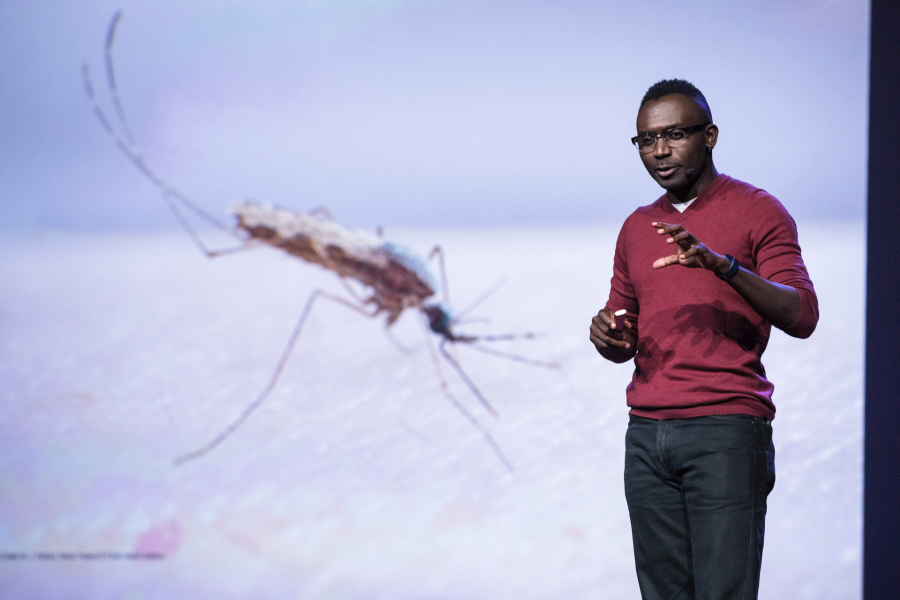TEDGlobal 2017 Tanzania Session 7 – Power Up

TEDGlobal 2017 Session 7 Speakers
William Kamkwamba is the boy who first stole the hearts of the audience with his windmill presentation in 2007 when he was only 14 years old. Since then, he’s co-written a book, graduated from African Leadership Academy and Dartmouth, traveled the world, is working with farmers to get their crops into supermarkets, and more. “My dream,” says Kamkamba, “is to continue the work I’m doing, trying to find the ways of solving some of the problems people are facing in my community or the world in general.”
ALSO READ: 9-Year-Old Grace Busari Starts Ankara Teddy Bear Brand To Help Homeless Kids
 Host Chris Anderson and William Kamkwamba reunite onstage in Arusha, 10 years after William’s pioneering talk here at age 14. Photo: Bret Hartman / TED
Host Chris Anderson and William Kamkwamba reunite onstage in Arusha, 10 years after William’s pioneering talk here at age 14. Photo: Bret Hartman / TED
Fredros Okumu
Catches mosquitoes for a living to study them. As mosquitoes build resistance to insecticides, new ways must be found to control their populations. Therefore, after some rather intense study of mosquito biology, Fredros’ research team has developed some rather unconventional methods for targeting and culling the malaria vector that has been described as the most dangerous animal on the planet.
 Fredros Okumu studies the deadliest animal in the world: the mosquito. We know very little about this vector for malaria and other diseases, even as it develops resistance to our pesticides. (And real talk, one way you study mosquitos is to let yourself get bitten over and over.) Photo: Ryan Lash / TED
Fredros Okumu studies the deadliest animal in the world: the mosquito. We know very little about this vector for malaria and other diseases, even as it develops resistance to our pesticides. (And real talk, one way you study mosquitos is to let yourself get bitten over and over.) Photo: Ryan Lash / TED
Kevin Njabo
Takes the state with one relatable admission. He shares that he almost became one of the four of five Africans who never return to the continent after an education abroad. Therefore, he urges more people to do so: “For every skilled African who returns home, nine jobs are created in the formal or informal sector.” He points out that by building local scientific capacity, Africans can find solutions to the continent’s problems.
ALSO READ: The Story of William Kamkwamba’s Ingenuity Is Coming to Netflix March 1st 2019
 Audience member Amy Dickman gets onstage to tell the inspiring story of how her organization helped convert traditional lion killers into lion protectors (read more). Photo: Bret Hartman / TED
Audience member Amy Dickman gets onstage to tell the inspiring story of how her organization helped convert traditional lion killers into lion protectors (read more). Photo: Bret Hartman / TED
Kola Masha
Concerned that Africa is a young continent: 41% percent of the population is under 15, according to the UN’s population division. However, as the young demographic explodes, jobs have not kept up. This could spell disaster if these people do not find opportunities to make a decent life for themselves. In 2012, Masha created a company called Babban Gona to explore if it was possible to use agriculture as an engine to unlock opportunities for economic advancement to young people in Nigeria.
What do you do when you return to your country and visit the library, but can’t find books written by your country’s own people? Well, if you are Bibi Bakare-Yusuf, you become a publisher. However, this is obviously not a cakewalk (brief sidebar) but has to be done. The reason? Archives are not value-free, and whoever controls them controls the narrative.
 Bibi Bakare-Yusuf started a publishing company to preserve African texts — and to deliver them safely to future generations. Photo: Bret Hartman / TED
Bibi Bakare-Yusuf started a publishing company to preserve African texts — and to deliver them safely to future generations. Photo: Bret Hartman / TED
ALSO READ: Investors Are Cashing in On Tanzania’s Boom in Fish Export. Here is Why
All Sessions
1. Session 1 – A New Map
2. Session 2 – A Path Forward
3. Session 3 – One Jump Forward
4. Session 4 – Exploring hard truths
5. Session 5 – Visual Thinking
6. Session 6 – Urban 3.0
7. Session 7 – Power Up
Session 8 – Manifestos






Responses